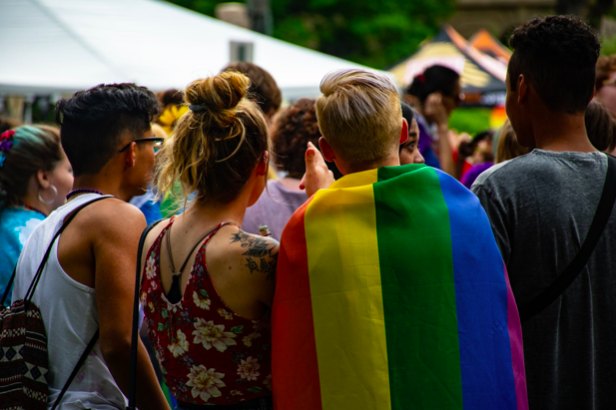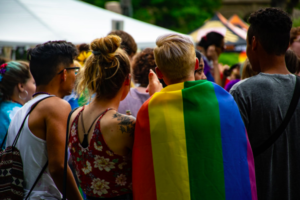Mental illness is a struggle many people face, but it’s especially prevalent in the LGBTQIA+ community because of the discrimination they experience. Further, despite the higher rates of mental illness, they’re less likely to receive the treatment they need.
For example, LGBTQIA+ teens are six times more likely to have depression symptoms than their cisgender, heterosexual peers. However, at the same time, about 8 percent of LGBTQIA+ individuals and an additional 27 percent of transgender individuals have been denied health care.
We need allies to not only stand with queer people as a whole, but also to support their mental health specifically. With higher suicide rates, LGBTQIA+ lives are at risk.
Keep reading for how you can be a mental health ally to your queer + friends, according to mental health professionals who are also in the community.
Ask them about their pronouns, being wary of the word “preferred”
The most simple way you can support queer people is by asking what their pronouns are instead of just assuming. “It is important to do this as not everyone identifies with binary gender roles (male and female) and being referred to as these would be hurtful,” said David Cato, LCSW, TCT, SEP, and clinical director at Sierra Tucson.
Additionally, while some people may be okay with two pronouns, such as “she” and “they,” they may prefer one or the other. However, asking someone about their “preferred pronouns” can be offensive, so it’s best to avoid the word “preferred.” According to Cato, that word can imply the person’s answer isn’t absolute (or that it was a choice).
Avoid reaching out to family members in times of need
While asking your friend’s family for advice may be your gut reaction when your friend is hurting, doing so can cause a negative reaction. “It is tempting to push for help from the ‘obvious’ places, but they may be the source of the pain,” said Robin Hornstein, PhD, a licensed psychologist. Sometimes, family members aren’t accepting of people’s sexuality or gender identity, and may cause additional harm. Instead of reaching out to them, consider some of these other suggestions listed.
Encourage seeing a professional — preferably one in the LGBTQIA+ community — and help them find someone if needed
Some queer individuals may already work with a therapist or mental health provider, but some may not. Regardless, encourage them to seek professional support if they can.
“Encourage LGBTQIA+ individuals to search for resources, or you can assist them in their search for resources if needed. Many cities offer LGBTQIA+ support services and are usually free to access,” Cato said.
Dr. Hornstein also noted the importance of finding a professional who’s either queer or a solid ally. “That helps reduce running into stigma, which may have been stopping them from reaching out,” she explained.
And if you think your friend may be in danger, get help immediately. “… Offer to take them to the nearest mental health or emergency room center or call 911. This is not the time to just try to be there 24/7 to protect them; it is a time for action,” Dr. Hornstein said.
Listen more than you speak
When we’re trying to show compassion and empathy to someone who’s hurting, we can feel tempted to share our own experiences. However, according to Dr. Hornstein, this isn’t always the best choice.
“Listen… You can always ask if they want to hear your path, but they really may be in a place where they would decide you had it worse, so why should they talk. I know it is hard, but ask questions and leave space,” she suggested.
Ask what you can do
Instead of assuming what your friend needs, ask them. This way, you can help them more effectively and create a safer space. “Everyone needs something different, so assuming is not helpful. An LGBTQIA+ person would feel more safe when presented with questions about their particular needs,” Cato explained.
Some examples of questions you can ask, according to Dr. Hornstein, include “Are you okay? Do you need anything? Can we hang out this weekend?” These open-ended questions show concern and support.
Remind them they’re not alone
Consider sharing your identity, whether you’re LGBTQIA+ or an ally. “If you are an LGBTQIA+ ally, it is helpful to share this with an LGBTQIA+ person who is struggling. If you are LGBTQIA+ and have shared similar experiences, let them know as this can be comforting,” Cato said.
Be present and engage in acts of kindness
Another tip is simply being present and kind. “Bring a meal, buy them a journal, invite them to a holiday if they are estranged from or far away from their own family. Acts of kindness are important,” Dr. Hornstein said. “Buy them a book to read about someone who has been dealing with a similar issue and make sure they like to read! Being present in action, in listening and just around, is a big comfort.”
Encourage them to utilize all of their support systems
While seeking a professional is best, many other people in your friend’s life can play a significant and positive role — and they can also be more accessible sometimes. “See what supports they already have in place they can utilize. Examples of support would be family, friends, other LGBTQIA+ individuals, teachers, coworkers, et cetera,” Cato said. “Someone may feel safe sharing personal things with their teacher, but maybe not their parents. You can help connect them to a helpful resource, though you may already be one for them!”
As an ally, you play a crucial role in your LGBTQIA+ friends’ lives and well-being. Keep these tips in mind and show support with as much love as you can, all while taking care of yourself, too.
 Ashley Broadwater is a recent graduate of UNC-Chapel Hill, where she studied Public Relations in the Hussman School of Journalism and Media. She’s passionate about mental health, body positivity, relationships, Halloween, and Dad jokes.
Ashley Broadwater is a recent graduate of UNC-Chapel Hill, where she studied Public Relations in the Hussman School of Journalism and Media. She’s passionate about mental health, body positivity, relationships, Halloween, and Dad jokes.


There are no comments
Add yours